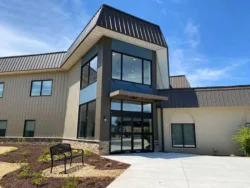Medication-assisted treatment (MAT) is an evidence-based treatment option for individuals recovering from substance use disorders including opioid addiction. MAT combines medications with behavioral therapy to treat the whole person. This type of therapy helps support the individual during the early stages of their recovery. Medication-assisted treatment paired with behavioral therapy reduces the chances of relapse and supports the individual into long-term recovery.
Different medications are used for MAT at different Pyramid Healthcare facilities. Contact the location nearest you for specific offerings.
MAT at Pyramid Healthcare
Outpatient MAT Services
Clients seeking MAT services meet with our clinical team as well as a nurse and/or physician at the facility to make a joint decision about the appropriate course of treatment as well as the most appropriate form of MAT for the individual. If some form of MAT is recommended, the client is prescribed an individualized dose of medication and will participate in random, mandatory urine screens under supervision to verify their drug-free status. The individual will be assessed for the appropriate therapeutic level of care and engage in treatment services paired with their MAT. As the individual stabilizes, the frequency of treatment visits reduces over time.
Inpatient MAT Services
MAT services are often a vital component during a residential treatment stay at Pyramid Healthcare. Clients who are admitting to a withdrawal management program for an opioid use disorder will sometimes begin MAT as a part of their detox protocol. In many cases, the client may decide to discontinue MAT upon completing their detox and entering one of our residential programs. In other cases, however, our team may recommend an MAT maintenance program in which the client continues on their prescribed medication for an extended period, both throughout residential treatment and often after discharge. Additionally, clients can be set up for MAT induction following residential treatment as part of their aftercare plan when appropriate. For appropriate clients, MAT maintenance paired with behavioral therapy reduces the risk of relapse and greatly supports the transition back to day-to-day living.
What You Should Know About MAT
Even though MAT is an evidence-based treatment approach, there are still misconceptions or concerns about this therapy.
MAT does not replace one addiction for another
While MAT sometimes involves the use of medications that are classified as opioids, proper prescribing and use of MAT does not produce the same “high” or likelihood for misuse or addiction.
Methadone is a synthetic opioid agonist that is used to eliminate withdrawal symptoms and reduce cravings. Methadone slowly activates the opioid receptors. This is unlike other opioids such as heroin or morphine, which quickly activate the opioid receptors. Buprenorphine (brand name Suboxone) is a partial opioid agonist that does not activate receptors as strongly as full opioid agonists do.
Vivitrol® (brand name for Naltrexone) is an opioid antagonist that blocks opioid receptors. Vivitrol® is an injection that releases Naltrexone over several weeks (about a month). Therefore, it’s an effective medication for preventing relapse. Patients must have a prescription for Vivitrol®.
It’s also important to note that these medications are administered by a medical professional in a specialized treatment program.
Medications are safe
Methadone, Buprenorphine, and Naltrexone are drugs approved by the Food and Drug Administration to treat opioid use disorder. These drugs are also commonly referred to by their brand names, Suboxone and Vivitrol®. When administered by a medical professional or treatment provider, these medications have proven to be safe and effective.
In fact, medications are recommended for opioid withdrawal management instead of abrupt cessation.
MAT uses medications and other therapies
Counseling or behavioral therapy are equally important components of MAT. In fact, most programs require that clients participate in therapy; they cannot receive medications without therapy.
Is MAT Right for You?
While medications used in MAT are safe, some individuals may prefer to abstain. Everyone’s recovery journey is unique. Talk with a counselor or medical professional who can help you determine your treatment needs.
If you’ve tried treatment before and have been unsuccessful, MAT may be appropriate for you. Again, MAT often leads to better outcomes than other types of addiction treatment.
We provide Methadone Maintenance Treatment (MMT), Suboxone and Vivitrol® to help individuals overcome opioid addiction. Medication-assisted treatment is available at several of our treatment centers throughout Pennsylvania and Newport News, Virginia.




